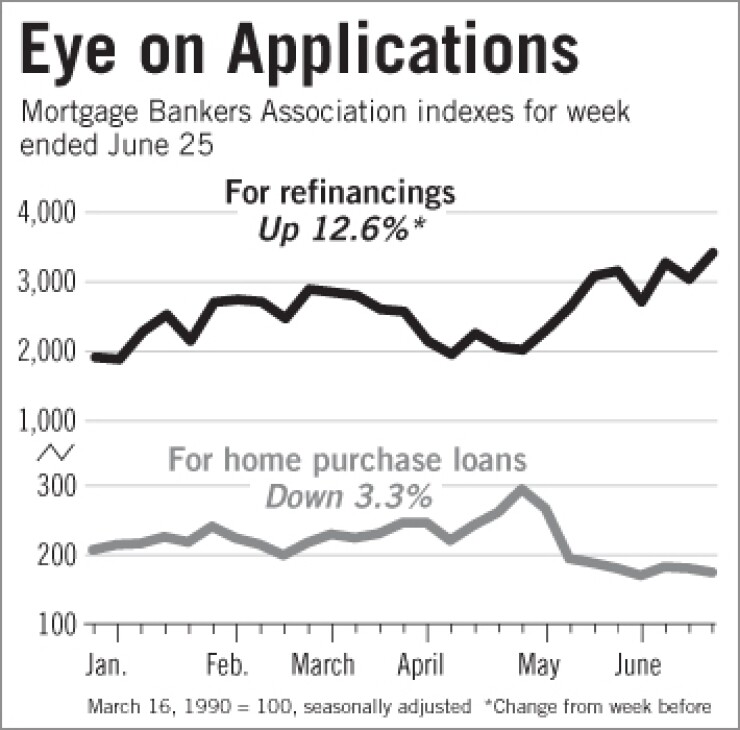
Second Time Around
Illinois Attorney General Lisa Madigan has filed a
The complaint, filed Tuesday in Cook County Circuit Court, alleges that Countrywide pushed minority borrowers into risky subprime mortgages more often than white borrowers in similar financial situations. The complaint also alleges that minority borrowers paid more in general for all types of mortgages.
The lawsuit is seeking an injunction against Countrywide to prohibit the company from engaging in discriminatory acts and pay civil penalties of $25,000 for each violation of the Illinois Human Rights Act as well as make restitution to all the victims.
"Bank of America needs to be held accountable by taking financial responsibility for cleaning up the devastation of the predatory company that it chose to take over," Madigan said in a press release Tuesday.
This is the second lawsuit the Illinois Attorney General's Office has filed against Countrywide since initiating an investigation two years ago into its lending practices during the boom years. The
Madigan first indicated she was investigating Countrywide for discrimination against minorities last July when her office filed a similar suit against Wells Fargo & Co. That case is ongoing.
B of A spokeswoman Jumana Bauwens said: "We are disappointed with the attorney general's decision to pursue litigation. We have fully cooperated with their investigation and have pointed out significant flaws in the methodology which we believe has been used as the basis for these claims."
On Wednesday, a coalition of clergy and community members known as National People's Action released a report claiming B of A is the biggest forecloser of homes in Chicago, responsible for nearly one out of five of the city's 23,000 foreclosure filings in 2009.
Buyback Blame
Freddie Mac listed five ways that lenders can avoid loan
Pamela Padgett, vice president of single-family underwriting at Freddie Mac, told banks and servicers in a Webinar last week that despite improvements in underwriting, lenders still are not catching common defects.
She described persistent problems with what she called "back-to-basics" fraud, such as altered documentation.
"We continue to find ineligible loans in our performing loan quality control sample," Padgett said. "Why? Because the message has not been delivered effectively across departments, especially production and underwriting."
Lenders still have plenty of "room for improvement in the loan quality of current originations," she said.
Other common defects leading to loan buybacks are appraisals that do not support the value of the property, insufficient income documentation, income errors and title deficiencies. Loans with these problems are twice as likely to become 90 days delinquent within the first year, Padgett said.
Moreover, six states have big problems with appraisal deficiencies: Michigan, Florida, Ohio, California, Illinois and Indiana. Padgett said in some instances, home values "may be inflated to secure financing."
Lest companies think buyback issues have gone away, Padgett warned that "counterparty risk exposure remains," with institutional failures increasing at six times the rate of failures in 2008.
Freddie
On the Right Track
An initiative designed to keep better track of vacant properties, and in turn, alleviate the mortgage industry from code violations, is making headway.
Since the program was established in January 2009 by the Mortgage Bankers Association, in
The MBA Vacant Property Registration Mers Initiative enables cities to
This information has helped foster better communication between city code enforcement officials and servicers, said Robert Klein, head of the MBA's vacant property registration committee and chairman of the Cleveland field service provider Safeguard Properties Inc.
Klein gave an update on the program during a keynote address last week at the annual Mers users conference. Mers is owned by Merscorp of Reston, Va.
The committee was established to address concerns over the patchwork of city ordinances that sprouted in response to the growing volume of vacant properties across the country. Frustrated with the difficulty in contacting parties responsible for abandoned properties, and the resulting blight and safety issues they caused, nearly 450 municipalities have enacted ordinances, each containing different regulations and fee structures. Companies like Merscorp were forced to act as fines for





